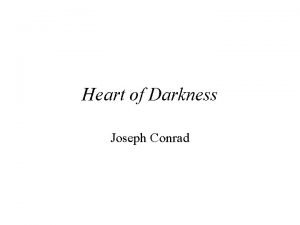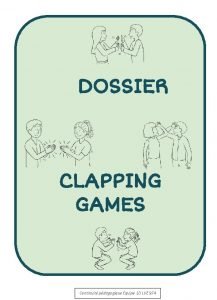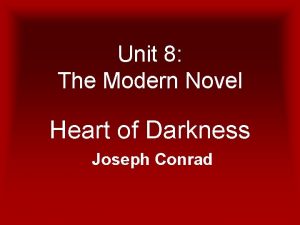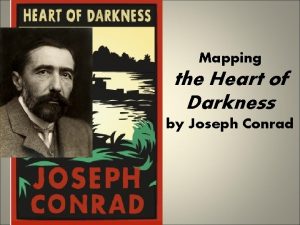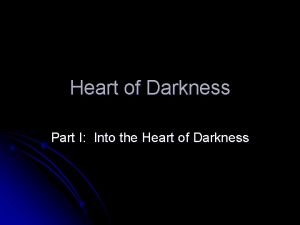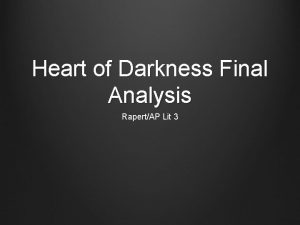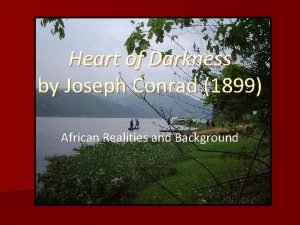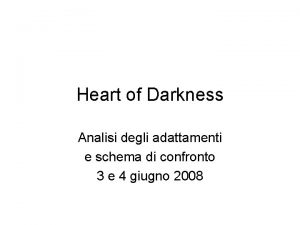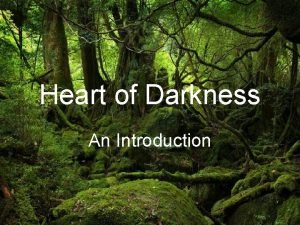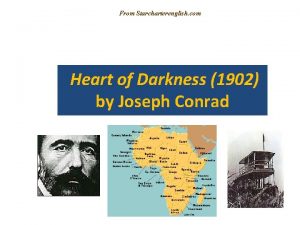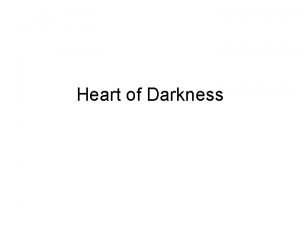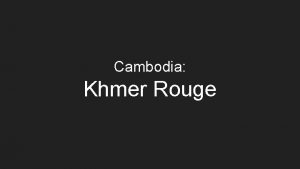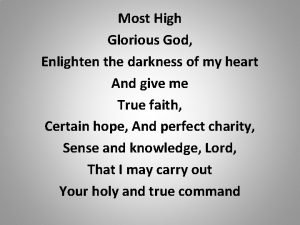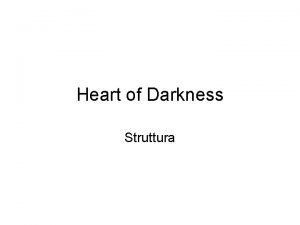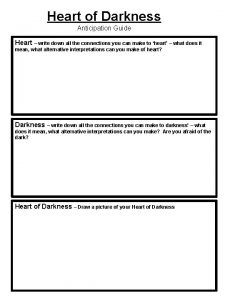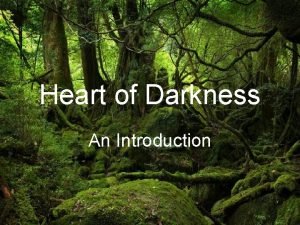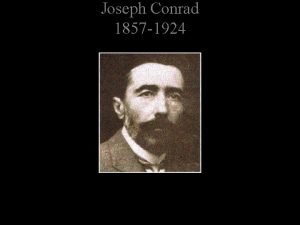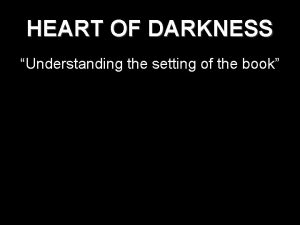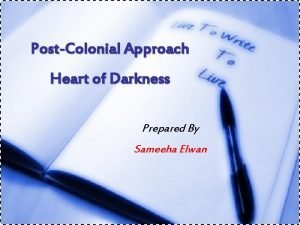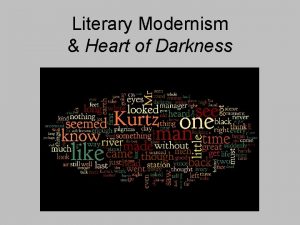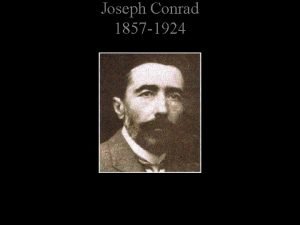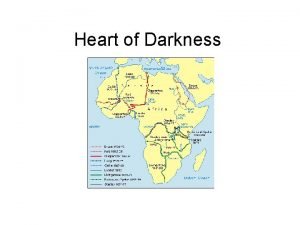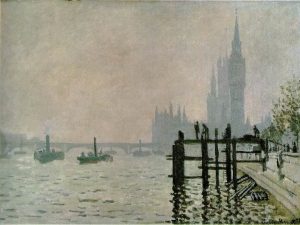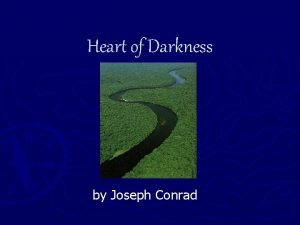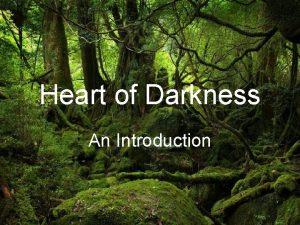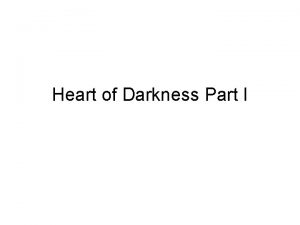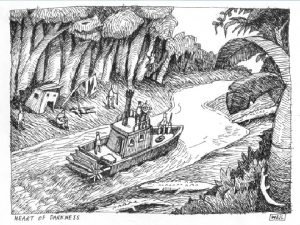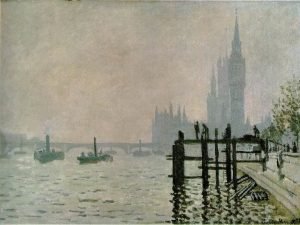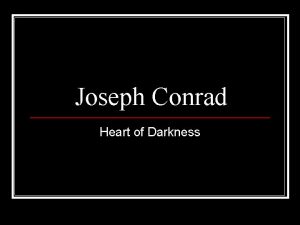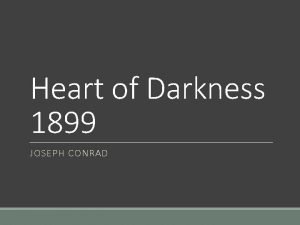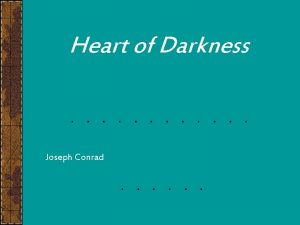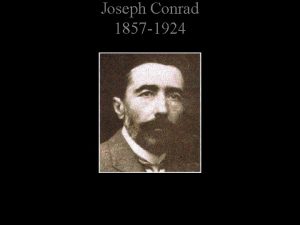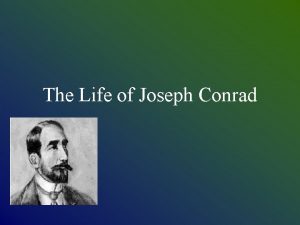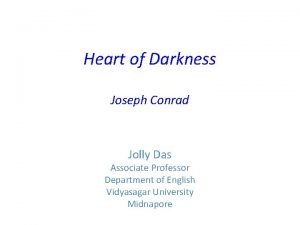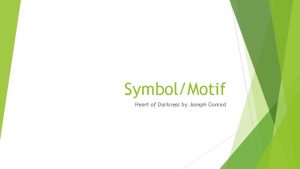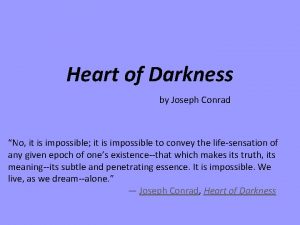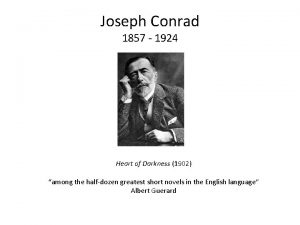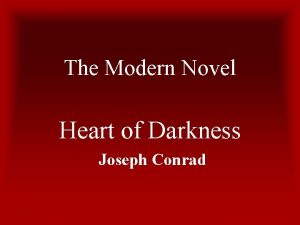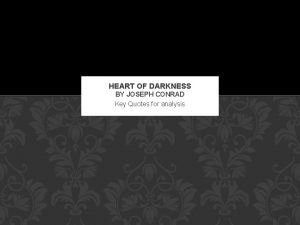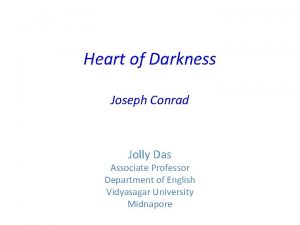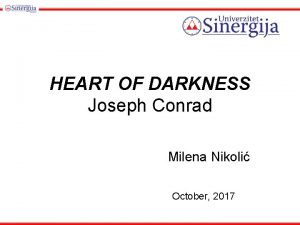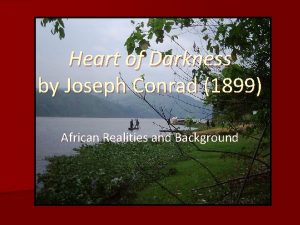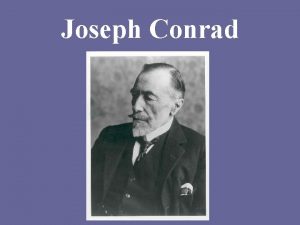HEART OF DARKNESS JOSEPH CONRAD Agenda Going through



































- Slides: 35

“ HEART OF DARKNESS “ JOSEPH CONRAD

Agenda : Going through the first ten pages of the novel , including : Plot Important Quotes Themes Characters Watching The Movie { The Part Presented }

*Starting with the plot, there is a narrator , unnamed, who begins the story by introducing four companions; they are sitting on the deck of a boat in the Thames Estuary waiting for the tide to turn. One of the men is Marlow, whose job is as an ivory transporter down the Congo. He tells the others of his experiences in the Congo, an African land. *The first chapter begins with Marlow telling his listeners how he had been obsessed by a river as a child (It was the Congo, though this is not stated in the story). “It had got filled since my boyhood with rivers and lakes and names. ” *Through his journey, Marlow develops an intense interest in investigating Kurtz , an ivory-procurement agent, and Marlow is shocked upon seeing what the European traders have done to the natives.

“The Nellie , a cruising yawl, swung to her anchor without a flutter of the sails, and was at rest. The flood had made, the wind was nearly calm, and being bound down the river, the only thing for it was to come to and wait for the turn of the tide” **** “The sea-reach of the Thames stretched before us like the beginning of an interminable waterway. ” **** “The air was dark above Gravesend, and farther back still seemed condensed into a mournful gloom, brooding motionless over the biggest, and the greatest, town on earth. ”

After describing the river and its slow-moving traffic, the unnamed narrator offers short descriptions of London's history to his companions who, with him, lazily lounge on the deck, waiting for the tide to turn. With him are the Director of Companies (their Captain), a lawyer, an accountant, and Marlow, the novel's protagonist. “And at last, in its curved and imperceptible fall, the sun sank low, and from glowing white changed to a dull red without rays and without heat as if about to go out”. As the sun sets, the four men become contemplative and brooding; eventually, Marlow breaks the spell of silence by beginning his tale about his voyage to the Congo. .

The other men remain silent while Marlow collects his ideas, after which he begins the story proper. The remainder of the novel becomes (with a few exceptions) the narrator's report of what Marlow tells him and the others on board the Nellie. Conrad's novel is thus a frame story, or story-within-a-story. The reason is that Conrad's frame narrator, like the reader, learns that his ideas about European imperialism are founded on a number of lies that he has wholeheartedly believed. By the end of the novel, Marlow's tale significantly changes the narrator's attitude toward the ships and men of the past.

Telling his journey to Congo , Marlow states that “But there was in it one river especially, a mighty big river, that you could see on the map, resembling an immense snake uncoiled, with its head in the sea, its body at rest curving afar over a vast country, and its tail lost in the depths of the land. ” From this describing quote we can see that Marlow’s likening the Congo River to a snake actually suggests the mesmeric powers of Africa. Thus, Conrad's comparing the river to a snake also suggests the danger Marlow will find in Africa and the temptations to which Kurtz succumbs when he sets himself up as a god to the natives. Despite the uncertainty of what lay there, Marlow had to go.

The tenth page concludes how Marlow gets a job on how he “tried the women”. she was actually his aunt “a dear enthusiastic soul” who knows “the wife of a very high personage in the Administration”. She was determined to get him “appointed skipper of a river steamboat, if such was my fancy. ” Said Marlow.

Important quotes

“Marlow sat crosslegged right aft, leaning against the mizzen-mast. He had sunken cheeks, a yellow complexion, a straight back, an ascetic aspect, and, with his arms dropped, the palms of hands outwards, resembled an idol. ” wanderer, too, ” Marlow’s character. He � is a thinker, observer and meditates upon everything he sees. He sits like Buddha � which shows that his journey was a journey for the body and the soul. The novel gives a vivid � description of Marlow`s outward experiences in the Congo, but it also gives a vivid description of the thoughts and ideas which crossed his mind during his journey.

“It had known and served all the men of whom the nation is proud, from Sir Francis Drake to Sir John Franklin, knights all, titled and untitled— the great knights-errant of the sea. It had borne all the ships whose names are like jewels flashing in the night of time, from the Golden Hind returning with her round flanks full of treasure, to be visited by the Queen's Highness and thus pass out of the gigantic tale” They were all in a � meditative mood, they exchange few words. “It” refers to the � Thames river. Many sailor have sailed � to sea through the Thames river to make a lot of achievements and adventures. Theme of imperialism. �

“Hunters for gold or pursuers of fame, they all had gone out on that stream, bearing the sword, and often the torch, messengers of the might within the land, bearers of a spark from the sacred fire. What greatness had not floated on the ebb of that river into the mystery of an unknown earth!” The sailors were: o Hunters of gold. o Seekers of fame. o Some carry the o sword. Other carry the o torch.

“And this also, " said Marlow suddenly, "has been one of the dark places of the earth. “ He was the only man of us who still "followed the sea. " The worst that could be said of him was that he did not represent his class. He was a seaman, but he was a wanderer, too, ” “This” refers to � London (Britain) Most sailors lead a � vigorous full of life and force at sea, but Marlow was different London was a dark � place a long time ago just like Africa. Marlow is different � from other sailors ( meaning he observes on sea and on land).

“But Marlow was not typical (if his propensity to spin yarns be excepted), and to him the meaning of an episode was not inside like a kernel but outside, enveloping the tale which brought it out only as a glow brings out a haze, in the likeness of one of these misty halos that sometimes are made visible by the spectral illumination of moonshine” Marlow is not ordinary � sailor. Marlow can observe � and understand things which are not clear. He was interested in � whatever he saw on land or on shore.

“I was thinking of very old times, when the Romans first came here, nineteen hundred years ago—the other day. . Light came out of this river since— you say Knights? Yes; but it is like a running blaze on a plain, like a flash of lightning in the clouds. We live in the flicker—may it last as long as the old earth keeps rolling! But darkness was here yesterday. Imagine the feelings of a commander of a fine—what d'ye call 'em? —trireme in the Mediterranean, ordered suddenly to the north; run overland across the Gauls in a hurry; ” Marlow start to narrate. � Britain was invaded by � the Romans nineteen hundred years ago. Theme of imperialism. � There was nothing in � Britain.

“Sandbanks, marshes, forests, savages, —precious little to eat fit for a civilized man, nothing but Thames water to drink. No Falernian wine here, no going ashore. Here and there a military camp lost in a wilderness, like a needle in a bundle of hay— cold, fog, tempests, disease, exile, and death, —death skulking in the air, in the water, in the bush. They must have been dying like flies here. Oh yes—he did it. Did it very well, too, no doubt, and without thinking much about it either, except afterwards to brag of what he had gone through in his time, perhaps. They were men enough to face the darkness” Theme of imperialism. � The Romans did not � find anything except the Thames river. Britain was a wet and � fogy place with no food. The smell of death was � all over the land. It was full of diseases.

“all that mysterious life of the wilderness that stirs in the forest, in the jungles, in the hearts of wild men. “They were no colonists; their administration was merely a squeeze, and nothing more, I suspect. They were conquerors, and for that you want only brute force— nothing to boast of, when you have it, since your strength is just an accident arising from the weakness of others. They grabbed what they could get for the sake of what was to be got. It was just robbery with violence, aggravated murder on a great scale, and men going at it blind—as is very proper for those who tackle a darkness. The conquest of the earth, which mostly means the taking it away from those who have a different complexion or slightly flatter noses than ourselves, is not a pretty thing when you look into it too much. What redeems it is the idea only. An idea at the back of it; not a sentimental pretence but an idea; and an unselfish belief in the idea—something you can set up, and bow down before, and offer a sacrifice to. . ’ ”

Theme of Imperialism. � Theme of Evil. � The Roman conquerors grabbed what they � could get. It was robbery with violence and murder. � They take away anything from people with � different complexions. ( racisms) What justifies conquer is only one governing � idea, an idea which conquerors can bow and offer sacrifices.

“ ‘Now when I was a little chap I had a passion for maps. I would look for hours at South America, or Africa, or Australia, and lose myself in all the glories of exploration. At hat time there were many blank spaces on the earth, and when I saw one that looked particularly inviting on a map (but they all look that) I would put my finger on it and say, ‘When I grow up I will go there. ’ The North Pole was one of these places, I remember… Other places were scattered about the hemispheres… the biggest, the most blank, so to speak— that I had a hankering after… It had become a place of darkness. But there was in it one river especially, a mighty big river, that you could see on the map, resembling an immense snake uncoiled, with its head in the sea, its body at rest curving afar over a vast country, and its tail lost in the depths of the land. And as I looked at the map of it in a shop-window, it fascinated me as a snake would a bird—a silly little bird. Then I remembered there was a big concern, a Company for trade on that river. ”

Marlow’s dream to sail upon a river � called the Congo. Marlow felt curious about a particular � river in the map. This river is a mighty, big river � resembling a huge snake. The river fascinated Marlow just like a � snake fascinates a little bird.

“ ‘I got my appointment—of course; and I got it very quick. It appears the Company had received news that one of their captains had been killed in a scuffle with the natives. This was my chance, and it made me the more anxious to go. It was only months and months afterwards, when I made the attempt to recover what was left of the body, that I heard the original quarrel arose from a misunderstanding about some hens. ” Marlow’s efforts to get � a suitable assignment.

“Therefore he whacked the old nigger mercilessly, while a big crowd of his people watched him, thunderstruck, till some man— I was told the chief ’s son—in desperation at hearing the old chap yell, made a tentative jab with a spear at the white man — and of course it went quite easy between the shoulder-blades. Then the whole population cleared into the forest, expecting all kinds of calamities to happen, The people had vanished. ” The vacancy to be filled � by a trading company. The company had just � lost one of its captains. He was killed in a fight � with the natives. The quarrel was over a � couple of hours. The captain has � hammered the chief of the village. His son killed the captain � for revenge. He evacuated the village � taking away the entire population in order to save them from the white men.

Themes

The Theme of Imperialism is a popular theme in this novel that means a policy in which powerful countries seek to extend their authority beyond their own borders.

The print media at that time was telling this lie which the idea of European journeys on Africa was to help , civilize , and educate the African natives.

Throughout this novel , Marlow shows us that what Europeans call “ civilization “ is a mask created by fear of the law and public shame which hides a dark heart.

In this novel , Marlow says that the imperialism started since the beginning of history. In nineteen hundred years ago , the Roman invaded britain and conquered it because at that time , the britain had been a dark country ; therefore , it was easy to grab it.

In addition , Marlow wants to say that the conquest can be excused only if the conquerors perform or do some constructive work in the backward country which they have conquered.

The theme of evil also started since the beginning of history. When the Roman conquerors grabbed what they could get. It was just robbery accompanied with violence and murder on a great scale. They used to take away anything from the people who have different complexion.

Marlow

He is the main character of the story. He is a longtime seaman, a rootless wanderer and frequent storyteller. Marlow is a sailor who revels in exploring the uncharted areas of the world. During his journey through the Congo, Marlow comes to realize that the seemingly uncultured natives probably have more sense than the white Europeans who have come to civilize them. He is clearly intelligent and eloquent. Marlow is philosophical, independent-minded, and generally skeptical of those around him. As the Narrator describes him: "to him the meaning of an episode was not inside like a kernel but outside, enveloping the tale which brought it out only as a glow brings out a haze. "

The narrator gives a physical description of Marlow by saying, "Marlow sat cross-legged right aft, leaning against the mizzen-mast. He had sunken cheeks, a yellow complexion, a straight back, an ascetic aspect, and, with his arms dropped, the palms of hands outwards, resembled an idol. " Apparently, Marlow is a thinker, observer and meditates upon everything he sees. He appears as a keen observer, and he also appears as a thinker who reflects upon everything that he observes. Furthermore, the narrator states Marlow as an "idol" which implies that his journey was a physical, mental and spiritual trip. However, the novel certainly gives a vivid description of Marlow's outward experiences in the Congo; but it also gives a vivid description of the thoughts and ideas which crossed his mind during his stay in that country.

Marlow is a versatile character, one of the few who does not belong to a distinct class. However, Marlow is not a typical sailor. He is a seaman and distinctly a wanderer over and above, as the narrator declares, "The worst that could be said of him was that he did not represent his class. He was a seaman, but he was a wanderer, too. " Indeed, Marlow was interested in whatever he saw on land or on shore. Moreover, Marlow thinks about each and everything he sees. He observes very deeply and through his thoughts we can conclude that this journey of Marlow was not only a physical one but a psychological one also.

Marlow's attitude towards imperialism: Marlow depicts the monstrous wastefulness and casual cruelty of the colonial agents toward the African natives. Furthermore, he reveals the utter hypocrisy of the entire colonial effort. In Europe, colonization of Africa was justified on the grounds that not only would it bring wealth to Europe, it would also civilize and educate the "savage" African natives. Marlow shows that in practice the European colonizers used the high ideals of colonization as a cover to allow them to viciously rip whatever wealth they could from Africa.

Reem Alotaibi Rawan Alhaqbani Nora Albanyan
 Joseph conrad heart of darkness summary
Joseph conrad heart of darkness summary Lve
Lve If you are going through hell, keep going
If you are going through hell, keep going Heart of darkness as a modern novel
Heart of darkness as a modern novel Main character in heart of darkness
Main character in heart of darkness Heart of darkness symbols
Heart of darkness symbols Heart of darkness summary part 2
Heart of darkness summary part 2 Heart of darkness deaths
Heart of darkness deaths Themes heart of darkness
Themes heart of darkness Heart of darkness analysis
Heart of darkness analysis Heart of darkness introduction
Heart of darkness introduction Heart of darkness theme
Heart of darkness theme Heart of darkness pages
Heart of darkness pages Heart of darkness summary part 2
Heart of darkness summary part 2 Heart of darkness cambodia
Heart of darkness cambodia Heart of darkness mla citation
Heart of darkness mla citation O most high and glorious god
O most high and glorious god Tim roth heart of darkness
Tim roth heart of darkness Heart of darkness shmoop
Heart of darkness shmoop Modernism in heart of darkness
Modernism in heart of darkness Heart of darkness quotes racism
Heart of darkness quotes racism Setting heart of darkness
Setting heart of darkness Edward said two visions in heart of darkness
Edward said two visions in heart of darkness Modernism in heart of darkness
Modernism in heart of darkness Heart of darkness part 2
Heart of darkness part 2 Impressionism writing
Impressionism writing Heart of darkness map
Heart of darkness map Map of heart of darkness
Map of heart of darkness Heart of darkness diction
Heart of darkness diction Impressionism in heart of darkness
Impressionism in heart of darkness Heart of darkness part 2
Heart of darkness part 2 Heart of darkness lesson plans
Heart of darkness lesson plans Journey without maps graham greene
Journey without maps graham greene Agenda sistemica y agenda institucional
Agenda sistemica y agenda institucional A cell with four chromosomes
A cell with four chromosomes James is going through puberty quite early
James is going through puberty quite early
